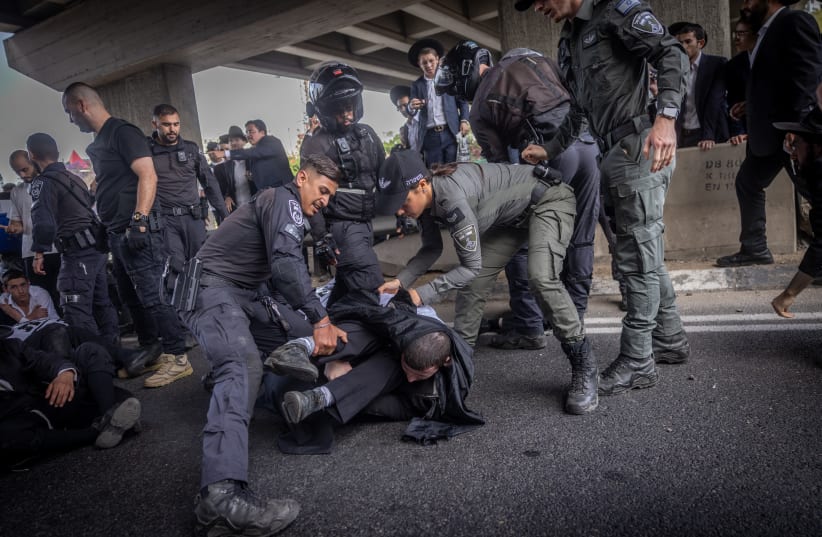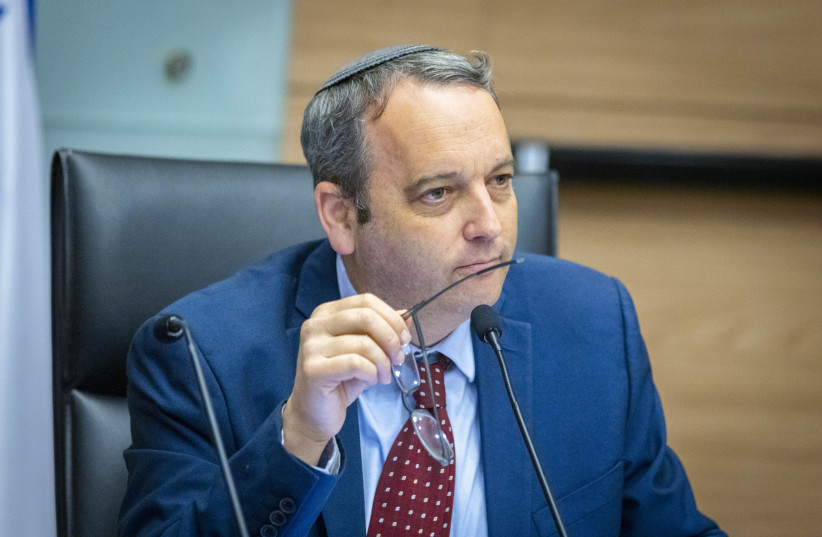The Knesset National Security Committee met Tuesday morning to discuss the conduct of Israel Police’s Hadera station officers at protests in Caesarea and “the continuing violation of the right to protest and the right of those arrested,” the committee said.
While the conduct of Hadera police was a focal point of the meeting, and some protesters said that conduct by Hadera’s officers is abnormal in how violent it is, police conduct and violence at protests around the country were discussed by the committee.
Protesters share their experience
Protesters shared their experiences at the meeting. A 55-year-old woman said that she was beaten by police at a protest. She described standing on the sidewalk when a senior police officer approached her and slapped her twice before grabbing her and attempting to drag her over police barricades. “I’m going to show you,” the officer said to her while dragging her, she said.
She was released from the officer’s grip before moving to the back of the protest, where she was again approached by officers who she said tackled her to the ground. She was arrested, and despite repeated requests, not given a chance to use a restroom, leading her to wet herself, she told the committee.
Another protester said he heard threats from police, saying that a senior officer told a protester he would “break all the bones in [their] body.”
MK Gilad Kariv (Labor), one of the MKs who requested that the meeting be held, said that Israel Police routinely break the law when it comes to their behavior at protests.
Among additional issues he listed, he said that senior police officers have made comments against protesters that are political in nature, and that senior officers often refuse to provide a reason for the arrests.
Kariv quoted court decisions from hearings of arrested protesters that indicated police made needless arrests and held those arrested overnight without cause.
“There was no justification to arrest this person and certainly no reason to hold him,” he cited from one such decision.
There are dozens of these unwarranted arrests, according to Kariv. He also said that there are many instances of police acting violently and with unreasonable force. Some of the police involved in this violence are senior officers and not beat cops or lower-ranking officers, he added.
Giving a possible explanation for the needless detainments, Kariv said that he was told by officers that there were instructions “from above” that for certain protests,0 “this night will not end without arrests.”
Kariv described a failure by police and Justice Ministry mechanisms to respond to instances in a transparent manner, giving a number of examples of unanswered complaints made by him and other organizations.
He also touched on confiscation by police of protesters’ equipment and belongings, and said that there is a new trend of confiscating phones that protesters are using to record police conduct and arrests.
NAOR SHIRI (Yesh Atid), another MK who called for the meeting, said that police enforced the law selectively, in some cases working as a well-oiled machine to quickly indict and in other cases failing to enforce entirely for seemingly political reasons.
MK Ofer Cassif (Hadash) said in the meeting that police covered up incidents of police violence, or lied about their behavior in reports.
Commander Gilad Bahat was a representative of the police. He was asked to make an official response to concerns raised at the meeting. Bahat said that some of the accounts protesters shared at the meeting were “one-sided versions.”
There were a number of court decisions that contradicted some of the things said in the meeting, he added without elaborating.
He said that the police are committed to allowing protests and are responsible for the public safety of all – including protesters.
“Freedom of expression ends where criminal offense begins,” he added, then stressed that police will defend the right of protest up until criminal offenses are made.
When there is suspicion that police acted illegally there are mechanisms in place to check this, he argued.
“Police are not always perfect. If there are mistakes, they should be examined,” he said. Police are doing the maximum, but “you must understand that this is a very complex task,” he told the committee.
Bahat said that police would submit answers in writing to questions sent to them by the committee that were not addressed in the meeting.

